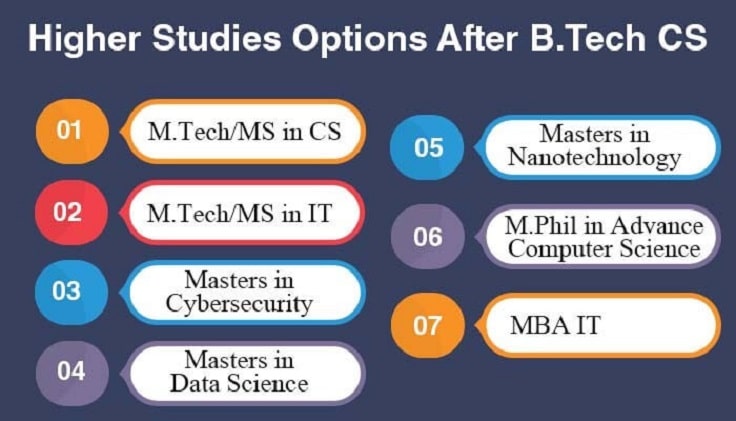Charting Your Course: What to Do After B.Tech in Computer Science

Having conquered the challenges of a B.Tech in Computer Science, you stand at a crossroads brimming with possibilities. The world of technology beckons, offering a multitude of exciting career paths. But with so many options, choosing the right direction can be overwhelming.
This comprehensive guide empowers you, the fresh B.Tech graduate, to navigate the exciting landscape that lies ahead. We’ll explore various career options, educational pursuits, and essential skills to cultivate, equipping you to make informed decisions and launch a fulfilling career in the ever-evolving realm of computer science.
Delving into the World of Work:
For those eager to dive straight into the workforce, numerous rewarding opportunities await:
- Software Engineer: This is the quintessential role for computer science graduates. Software engineers design, develop, test, and maintain software applications. Specialization areas include web development, mobile app development, and system software development.
- Data Scientist: The ever-growing field of data science offers a thrilling combination of computer science and statistics. Data scientists extract valuable insights from vast datasets, influencing business decisions and driving innovation.
- Web Developer: If you have a passion for building websites and web applications, this path is ideal. Web developers utilize programming languages like HTML, CSS, and JavaScript to create user-friendly and interactive web experiences.
- Network Engineer: The backbone of any organization’s digital infrastructure, network engineers design, implement, and maintain computer networks, ensuring smooth communication and data flow.
- Cybersecurity Analyst: With the ever-increasing threat of cyberattacks, cybersecurity analysts are in high demand. They protect computer systems and networks from unauthorized access and malicious attacks.
Remember: This is just a glimpse into the vast array of career options available. Research specific roles that align with your interests and skillset.
Upskilling for the Future:
Whether you choose immediate employment or further education, continuously honing your skills is crucial in the dynamic tech landscape. Here are some avenues for upskilling:
- Online Courses: Numerous online platforms offer a vast array of courses, from programming languages to cloud computing.
- Coding Bootcamps: Upskill quickly with intensive coding boot camps that equip you with practical coding skills and prepare you for specific job roles.
- Certifications: Industry-recognized certifications demonstrate your expertise in specific technologies and enhance your employability. Consider certifications like CCNA for networking or AWS Cloud Practitioner for cloud computing.
- Personal Projects: Build your portfolio and showcase your skills by working on personal projects. Open-source contributions are also a great way to gain experience and network with the tech community.
The Power of Higher Education:
For those seeking a deeper theoretical foundation or specialized knowledge, pursuing higher education can be a valuable path:
- M.Tech in Computer Science: This master’s degree program delves deeper into computer science fundamentals, preparing you for research or specialized technical roles.
- M.S. in Information Technology (IT): This program offers a broader perspective, encompassing not just computer science but also IT management, networking, and cybersecurity.
- MBA: An MBA can equip you with valuable business and leadership skills, making you a well-rounded candidate for management positions in technology companies.
Remember: Consider your career goals, financial situation, and time constraints when deciding if further education aligns with your aspirations.
Building a stellar resume and Portfolio:
A well-crafted resume and portfolio are your key tools for landing your dream job. Here’s how to create impactful ones:
- Resume: Tailor your resume to each specific job application, highlighting relevant skills and experiences. Showcase your technical skills, the programming languages you’re proficient in, and any relevant projects.
- Portfolio: Build a portfolio website or online presence that showcases your coding skills and project work. This allows potential employers to get a taste of your abilities.
Remember: Keep your resume concise and easy to read, and ensure your portfolio is user-friendly and visually appealing.
The Journey Begins:
The road ahead is filled with exciting possibilities. Embrace continuous learning, stay passionate about technology, and don’t be afraid to step outside your comfort zone. Here are some additional tips for a successful career launch:
- Network: Connect with other tech professionals at meetups, conferences, and online communities. Building a strong network can open doors to new opportunities.
- Develop Soft Skills: While technical skills are essential, don’t underestimate the importance of communication, teamwork, and problem-solving skills.
- Stay Updated: The tech industry evolves rapidly. Stay up-to-date with the latest trends and technologies by reading tech blogs, attending workshops, and participating in online communities.
